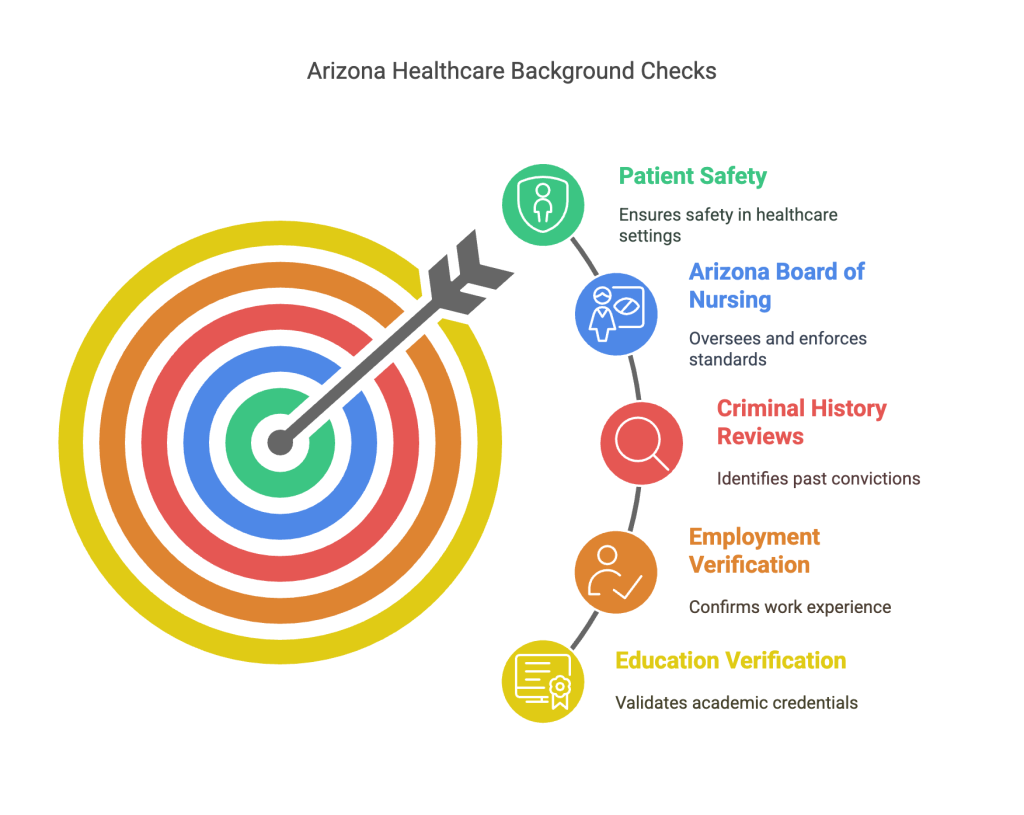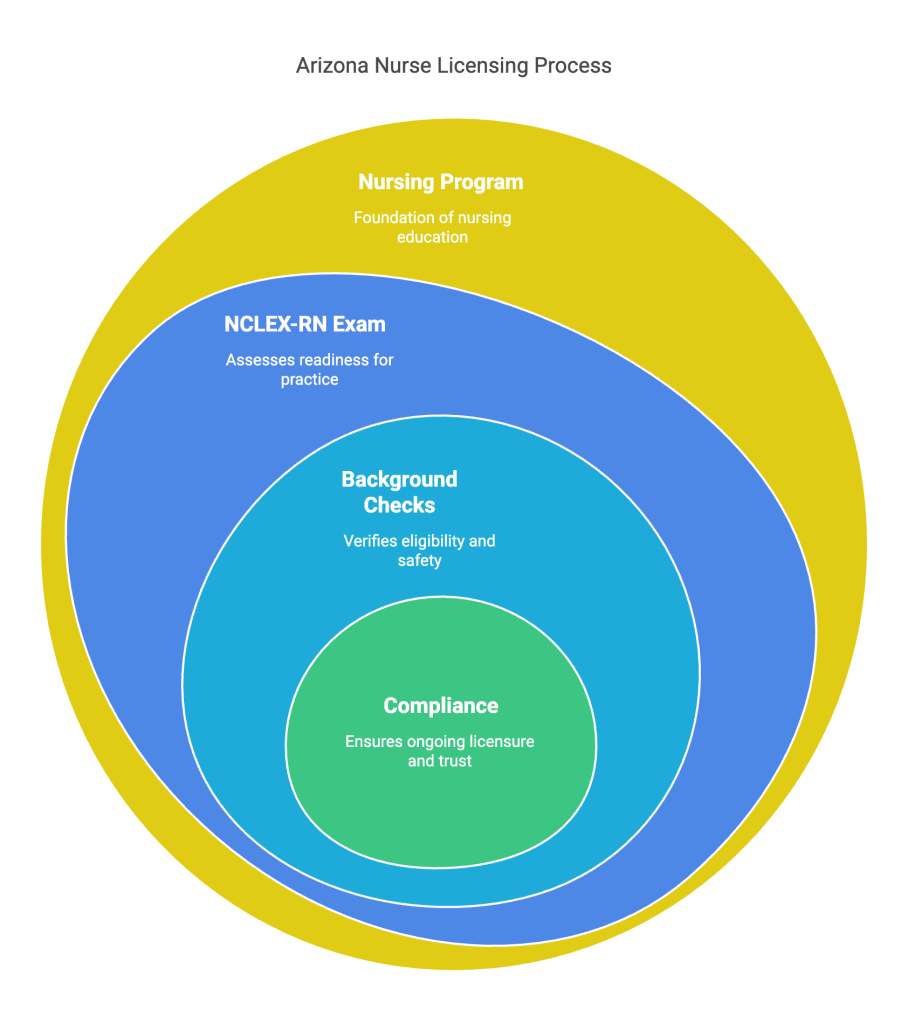In the world of healthcare, ensuring the safety of patients and maintaining the highest standards of professional conduct are paramount. That's where background checks come in, serving as a critical element in the vetting process for healthcare professionals. For those in Arizona, understanding the state's specific requirements, particularly for nursing, is essential. This guide provides a thorough examination of the Arizona healthcare background checks, specifically focusing on the Board of Nursing requirements, information on AZ nurse licensing, and factors that could lead to caregiver disqualifications in Arizona.
Key Takeaways
- Healthcare background checks in Arizona are essential for ensuring patient safety by verifying criminal history and professional credentials.
- The Arizona Board of Nursing requires fingerprint submissions and comprehensive applications for nursing licensure to maintain high safety standards.
- Understanding state-specific rules is crucial for healthcare workers in Arizona to ensure compliance with licensure and employment requirements.
- Arizona law offers paths for individuals with criminal records to demonstrate rehabilitation and become eligible for caregiving roles.
- Applicants and employers face common challenges with background checks, such as document errors and communication issues, but proactive measures can help overcome these obstacles.
Introduction
You're about to step into the world of healthcare background checks, where the safety of patients and the integrity of professionals sit at the top of the list. Especially in the healthcare sector, background checks aren't just a formality—they’re your frontline defense against potential risks. They help ensure that the people providing care are trustworthy and competent. By screening for criminal records, verifying employment history, and checking educational credentials, these checks are vital in maintaining a safe environment.
In Arizona, the regulatory landscape adds another layer of complexity. It's not just about meeting a generic standard; it's about aligning with state-specific guidelines. Arizona has its own set of rules and requirements that can affect your path to becoming a licensed healthcare worker, particularly if you're striving to become a licensed nurse. Understanding these local requirements isn't just beneficial—it’s crucial. Whether you're in the process of getting your license or already working in the field, staying informed helps you navigate through potential hurdles confidently.
Understanding Arizona Healthcare Background Checks
Healthcare background checks are tools for assessing the suitability of candidates for roles in medical settings. Their primary purpose is to ensure patient safety by verifying the history and credentials of healthcare professionals. In Arizona, these checks are particularly critical due to the state's unique regulatory framework.
The central agency overseeing healthcare background checks for nurses in Arizona is the Arizona Board of Nursing. This body establishes the standards for checks and enforces compliance among practitioners. Recognizing these requirements is vital, as they shape who gets to practice within Arizona’s healthcare sector.
Typical background checks for nursing applicants include a few essential elements. Criminal history reviews are a cornerstone, focusing on any past convictions that could pose risks to patients or healthcare environments. Employment verification confirms previous work experience, ensuring candidates have the stated professional history. Education verification corroborates that applicants have the necessary academic credentials before entering the workforce.

Healthcare background checks might sound like routine procedures, but they're anything but mundane. They play a crucial role in maintaining the integrity of the health sector. As an applicant or employer, understanding what these checks involve can better prepare you for navigating Arizona's healthcare landscape. Are you familiar with the specific steps your role entails when it comes to background compliance?
Arizona Board of Nursing: Specific Requirements
The Arizona Board of Nursing plays a pivotal role in ensuring that nurses meet stringent safety and competence standards. They enforce a comprehensive framework that every nursing applicant must navigate to secure licensure.
The journey begins with a rigorous background check process. First, you must submit fingerprints to an authorized vendor. This step helps to verify your identity and criminal history. Fingerprinting acts as a foundational check, scrutinizing for any past convictions or pertinent legal issues.
Once you've completed fingerprinting, the formal application process kicks in. Here, you provide detailed personal data and professional history. The Board uses this information to cross-reference your background with state and federal criminal databases. This way, they assess your eligibility and ensure you meet the legal requirements intended to protect patients.
The emphasis here is clear: Arizona healthcare background checks are designed with patient and community safety in mind. They aren't arbitrary; they're a calculated measure to maintain trust and reliability within the healthcare system. By meeting these standards, you reinforce your commitment to upholding the stringent safety and competence standards expected of healthcare professionals.
AZ Nurse Licensing: The Process
Navigating the path to nurse licensure in Arizona involves several important steps. To start, aspiring nurses must complete an accredited nursing program. This typically means earning a degree such as an Associate Degree in Nursing (ADN) or a Bachelor of Science in Nursing (BSN). Once educational requirements are met, candidates must pass the National Council Licensure Examination (NCLEX-RN). This exam is crucial—it assesses the readiness of nursing graduates to practice safely and effectively.

Background checks play a vital role in the licensure process. In Arizona, this involves fingerprinting as part of the criminal background check. The Arizona Board of Nursing requires applicants to submit a fingerprint card to determine their eligibility. This step ensures that all licensed nurses meet the high standards expected in the healthcare sector.
For those already holding a nursing license, renewing it is not just about new application forms. Nurses must maintain compliance with continuing education requirements and ensure their background checks remain current. Regular background checks are part of the ongoing compliance process, highlighting any new issues that could affect their licensure status.
Staying compliant with Arizona's licensure requirements not only secures your credential but reinforces trust with patients and employers alike. Are your records up to date, or is it time to revisit your background check status? Keeping these aspects in check supports a smooth and uninterrupted nursing career in Arizona.
Caregiver Disqualifications in Arizona
Certain factors can disqualify individuals from caregiving positions in Arizona. Key offenses include violent crimes, sexual offenses, or any felony involving harm to others. Additionally, certain misdemeanors may also lead to disqualification, particularly those related to neglect or abuse.
However, not all hope is lost for those with past convictions. Arizona offers potential paths for rehabilitation, allowing individuals to present evidence of reform. This can involve showing a history of good behavior post-conviction or completing a relevant rehabilitation program.
Some exceptions may apply, but they are case-specific and require a thorough review. It’s vital to understand that a past mistake doesn’t always close the door completely. The reality is nuanced, and every case is unique.
When considering a career in caregiving, ask yourself: What steps are you willing to take to demonstrate your readiness? Understanding these factors can help you navigate the employment landscape more effectively.
Legal and Ethical Considerations
Handling background checks requires a careful balance between gathering necessary information and respecting individual privacy. In the U.S., various laws guide this process, including the Fair Credit Reporting Act (FCRA), which regulates the collection and use of consumer information. The FCRA ensures you're notified if a background check will be used against you and gives you the right to dispute inaccuracies.
In Arizona, specific legislation might align with or supplement federal guidelines to address local nuances. For instance, employers must adhere to the state’s unique privacy laws even as they conduct due diligence. Arizona does not ban the box for private employers, meaning criminal history inquiries can occur early in the application process. However, employers are encouraged to consider the nature and relevance of offenses related to job functions.
Ethical considerations underscore the need to handle all personal data with the utmost confidentiality. Employers should secure consent from applicants before conducting checks and ensure data protection measures are in place to prevent unauthorized access or use. They should also communicate clearly about how information will be used and provide opportunities for applicants to respond to findings.
Have you ever wondered how your rights are protected during a background check? Understanding these legal frameworks ensures not only compliance but also fair treatment in the hiring process. How prepared are you to navigate these complexities in your next job application?
Common Challenges and Solutions
Navigating the background check process can be confusing. Applicants and employers often face several common challenges. Missing documents are a frequent issue. Applicants sometimes forget to include essential paperwork, causing delays. Make a checklist to ensure you have everything needed.
Another issue is miscommunication. Regulatory bodies have specific requirements. If unclear, reach out early. Clarification can save time and prevent application rejection.
Errors in background reports happen. If you spot a mistake, contact the relevant agency immediately. Correcting inaccuracies quickly is crucial.
Timing is also a challenge. Background checks can take weeks. Starting the process early is vital. Begin gathering documents and completing requirements well before deadlines.
Employers may face obstacles too. They might receive partial data or have trouble verifying information. Establish clear channels of communication with applicants and regulatory agencies to minimize these issues.
Understanding these challenges and being proactive can smooth the way for both applicants and employers alike.
Conclusion
Arizona healthcare background checks play a crucial role in maintaining patient safety and professional standards. They encompass criminal history, employment verification, and education checks. The Arizona Board of Nursing requires fingerprinting and formal applications for thorough vetting. Compliance with these checks is integrated into nurse licensing, affecting both initial and ongoing credentialing.
Navigating Arizona’s regulatory landscape may seem complex, but it's a vital step for those pursuing a career in healthcare. By staying informed and proactive in meeting these requirements, you can secure your place in a competitive and rewarding field. Continuous attention to evolving laws ensures you remain compliant, safeguarding your career and the well-being of those you serve.
Frequently Asked Questions (FAQs)
What crimes disqualify nurses in AZ?
In Arizona, crimes involving moral turpitude, such as theft, fraud, or violent crimes, can disqualify you from becoming a nurse. Sexual offenses and drug-related crimes also pose significant issues.
How long do AZ nursing checks take?
Background checks for nursing in Arizona typically take anywhere from 4 to 6 weeks.
Can a DUI affect a nursing license in AZ?
Yes, a DUI can affect your nursing license. It may result in disciplinary actions or even suspension, depending on the circumstances.
Does Arizona accept out-of-state healthcare checks?
Arizona requires its specific background check process regardless of your previous state, though out-of-state checks can provide additional context.
How to appeal a denied AZ nursing license?
You can appeal by submitting a request for a hearing with the Arizona Board of Nursing, accompanied by any supporting documentation to contest the decision.
Are expunged records visible to AZ medical boards?
Expunged records are generally not visible to Arizona medical boards, although certain exceptions may apply.
Do AZ hospitals require FBI checks?
Yes, many hospitals in Arizona require FBI checks to ensure comprehensive background screening.
What’s the cost of healthcare checks in Arizona?
Healthcare checks in Arizona can range from $50 to $100, depending on the specifics of the background check.
Can you work in healthcare with a misdemeanor in AZ?
You can potentially work in healthcare with a misdemeanor, but it depends on the nature of the misdemeanor and the employer's policies.
Does AZ check the National Practitioner Data Bank?
Yes, Arizona checks the National Practitioner Data Bank for information on any sanctions or disciplinary actions.
What are the eligibility requirements for an AZ nursing license?
To be eligible for an Arizona nursing license, you must graduate from an accredited nursing program and pass the NCLEX-RN exam.
How often do you need to renew your nursing license in AZ?
In Arizona, you must renew your nursing license every four years.
What are the continuing education requirements for nurses in AZ?
Nurses in Arizona are required to complete a certain number of continuing education hours, varying based on specific licensure needs.
Can international nurses apply for licensure in AZ?
Yes, international nurses can apply, but they must meet specific evaluation requirements, including passing the NCLEX-RN and potentially an English proficiency test.
Definitions
Background Check
A background check is a process employers use to verify a candidate’s history before hiring. It typically includes reviewing criminal records, confirming past employment, and verifying education. In healthcare, these checks help ensure that professionals are qualified and do not pose a risk to patients.
Employment Verification
Employment verification confirms a candidate's previous work experience. Employers contact past employers to verify job titles, dates of employment, and responsibilities. This step helps ensure that applicants have the necessary experience and have been truthful about their work history.
Education Verification
Education verification confirms that a candidate has earned the degrees or certifications they claim. Employers check with schools, colleges, or certification boards to validate credentials. In healthcare, this step ensures that professionals meet the required educational standards for their roles.
Fingerprinting
Fingerprinting is a security measure used in background checks to confirm identity and check criminal history. Applicants submit their fingerprints to an approved agency, which compares them against state and federal records. This step is required for nurses in Arizona to meet licensing requirements.
Criminal History Review
A criminal history review checks if an applicant has past convictions or legal issues that could impact their ability to work in a particular role. Employers and licensing boards assess the severity and relevance of any offenses. In healthcare, this review helps protect patients and maintain high safety standards.

GCheck Editorial Team
Meet the GCheck Editorial Team, your trusted source for insightful and up-to-date information in the world of employment background checks. Committed to delivering the latest trends, best practices, and industry insights, our team is dedicated to keeping you informed.
With a passion for ensuring accuracy, compliance, and efficiency in background screening, we are your go-to experts in the field. Stay tuned for our comprehensive articles, guides, and analysis, designed to empower businesses and individuals with the knowledge they need to make informed decisions.
At GCheck, we're here to guide you through the complexities of background checks, every step of the way.





